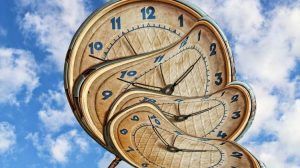Shayla Love in Tonic:
 In 2015, when cognitive neuroscientist Devin Terhune was hit by a car, the impact took less than a second, but he felt it to be much longer. “I was riding [my bike] very fast, and so when I hit the car I went flying back around 15 feet or more,” he says. “Objectively, I’m sure the whole thing probably unfolded in less than a second but I experienced flying through the air as lasting at least 5 seconds—it felt very slow.” Time stretched out from milliseconds to seconds and Terhune lived first-hand something we experience in less dramatic ways each day. We measure time in set amounts— seconds, minutes, and hours. But the way time feels is more slippery. Ten minutes while you’re bored is an eternity and those same ten minutes with your best friend disappear like nothing. This flexibility in perceiving time is only enhanced when psychedelic drugs enter the mix. A review from 1964 on hallucinogens reveals how long we’ve been playing with the dials of time—speeding it up, and slowing it down—through drugs. One account from 1913 on mescaline intoxication said that mescaline made a person feel like “the immediate future was rushing on at chaotic speed, and the time was boundless.”
In 2015, when cognitive neuroscientist Devin Terhune was hit by a car, the impact took less than a second, but he felt it to be much longer. “I was riding [my bike] very fast, and so when I hit the car I went flying back around 15 feet or more,” he says. “Objectively, I’m sure the whole thing probably unfolded in less than a second but I experienced flying through the air as lasting at least 5 seconds—it felt very slow.” Time stretched out from milliseconds to seconds and Terhune lived first-hand something we experience in less dramatic ways each day. We measure time in set amounts— seconds, minutes, and hours. But the way time feels is more slippery. Ten minutes while you’re bored is an eternity and those same ten minutes with your best friend disappear like nothing. This flexibility in perceiving time is only enhanced when psychedelic drugs enter the mix. A review from 1964 on hallucinogens reveals how long we’ve been playing with the dials of time—speeding it up, and slowing it down—through drugs. One account from 1913 on mescaline intoxication said that mescaline made a person feel like “the immediate future was rushing on at chaotic speed, and the time was boundless.”
A study from 1954 found time disorders in 13 out of 23 people under the influence of psychedelics. Most of them felt a “sense of temporal insularity,” where only the present was real and the past and future were far, far away. “One subject experienced a ‘timeless, suspended state; a few felt time to be slipping away very quickly, whilst in others the passage of time was slowed down,” the review wrote. “In one case where the mood fluctuated between elation and depression, the passage of time was experienced concurrently as rapid and slow.”
More here.
